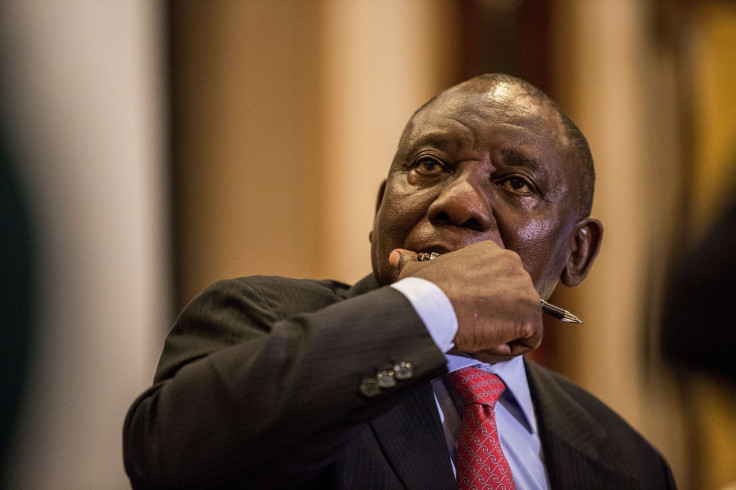As Coronavirus Cases Spike, South Africa Orders Three-Week Lockdown

KEY POINTS
- Virus cases have surged to more than 550 in only a week.
- Health Minister Mkhize warned up to 70% of the population might eventually contract the illness
- The lockdown will be difficult to impose upon South Africa’s overcrowded townships
South Africa, the second largest economy on the African continent, will enter a three-week lockdown on Thursday to stem the spread of coronavirus as infections surge.
South Africa now has confirmed at least 554 virus infections -- the most in Africa and a ninefold jump in only a week. Health Minister Zweli Mkhize warned that up to 70% of the population of 56 million might eventually contract the illness.
“Immediate, swift and extraordinary action is required if we are to prevent a human catastrophe of enormous proportions,” said President Cyril Ramaphosa on Monday “While this measure will have a considerable impact on people’s livelihoods, on the life of our society and our economy, the human cost of delaying this action would be far greater.”
Under the lockdown, people will only be allowed to exit their homes to purchase food, medical supplies, collect social grants or visit the doctor.
Most shops and businesses will be closed, but health workers, emergency personnel and security services will be permitted to work.
Essential service providers like groceries, pharmacies, banks and gas stations, as well as the Johannesburg Stock Exchange, will be allowed to stay open.
The army and the police will enforce the lockdown, although such restrictions may be difficult to impose upon South Africa’s overcrowded townships, where tens of thousands live in tiny shacks.
Moreover, while Ramaphosa declared a national emergency last week and imposed travel bans, closed schools and prohibited large gatherings, these measures have failed to slow down the virus’ spread.
Cases have been reported in all nine provinces, with Gauteng, the country’s economic heartland, recording the most cases at 207, followed by the Western Cape, at 100.
No deaths from the virus have yet been reported.
“The next few days are crucial,” Ramaphosa said. “Without decisive action the number of people infected will rapidly increase from a few hundred to tens of thousands, and within a few weeks to hundreds of thousands. This is extremely dangerous for a population like ours which has a large number of people with suppressed immunity.”
South Africa’s economy, already reeling from high unemployment, spiraling debt and recurring power outages, will suffer even more from the impact of the virus.
"The action we are taking now will have lasting economic costs," said Ramaphosa. "But we are sure that the cost of not acting now will be far greater."
Citibank’s South Africa economist Gina Schoeman said the economy will likely shrink by more than 2% this year, with the services industries taking “a big, big hit.”
“Shutdowns like this just mean that some things will never be able to return to how they were,” she said. “Base effects will help in the second half of the year, but this assumes we will go back to normal after three weeks.”
Ramaphosa has also unveiled various measures to limit the impact of the pandemic, including a four-month tax subsidy for low-income workers and a prohibition of unjustified price hikes by retailers. The government is also considering a plan to temporarily subsidize wages for workers in distressed industries.
Some small companies will also be permitted to postpone tax payments for six months.
In addition, South African banks are expected to announce measures to relieve debt of their beleaguered customers.
Two of South Africa’s wealthiest families -- the Oppenheimers and the Ruperts -- each vowed to provide 1 billion rand ($57 million) to support small businesses and save jobs.
The government’s Department of Small Business Development will use more than 500 million rand ($28.4 million) to help distressed small and medium-sized companies, while the Industrial Development Corp. and the Department of Trade and Industry will allocate more than 3 billion rand ($170 million) to support vulnerable firms.
Mosa Moshabela, dean aof the Nursing and Public Health School at the University of KwaZulu-Natal said the lockdown "is an opportunity to break transmissions.”
"With the additional week as a sort of buffer, we can assure that anyone who was infected before the lockdown will go through the symptoms and recover within those 21 days," he said.
Siviwe Gwarube, a member of parliament with the main opposition party, Democratic Alliance, supported the drastic measures taken.
"South Africa has a unique set of circumstances of [the] social economic status of people," Gwarube said. "There are over 50% who are poor and over 11 million South Africans are unemployed, so we need to be a lot more heavy-handed if we are going to be able to flatten the curve."
Ramaphosa added: “In the days and weeks and months ahead, the unity of our nation will be put to the test as never before. Let us never despair. We are surely going to prevail.”
© Copyright IBTimes 2024. All rights reserved.




















